
Page 4
Vedabbha-Jataka
Captured by robbers, a Brahmin makes treasure rain from the sky; a second band kills him because he cannot repeat the miracle. Mutual slaughter leaves only two robbers with the treasure. One poisons the other's food and is himself slain by his fellow.
Picture by : PongPang
Coloured by : Mint, PongPang
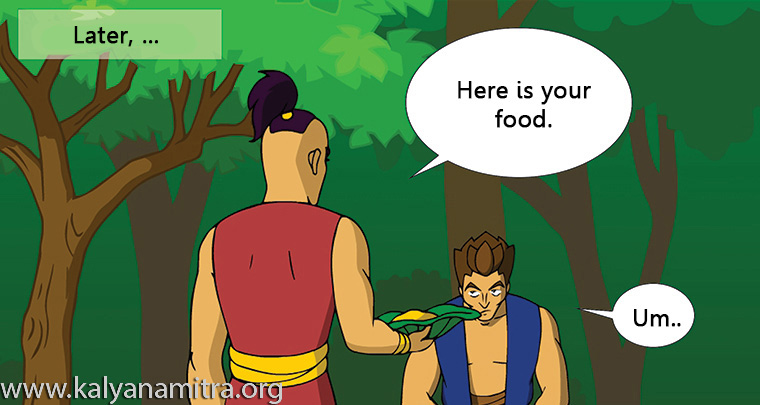

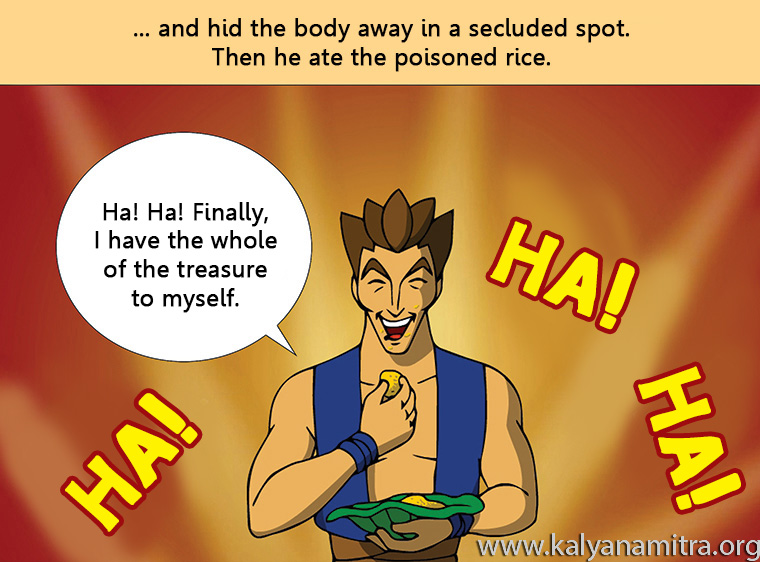
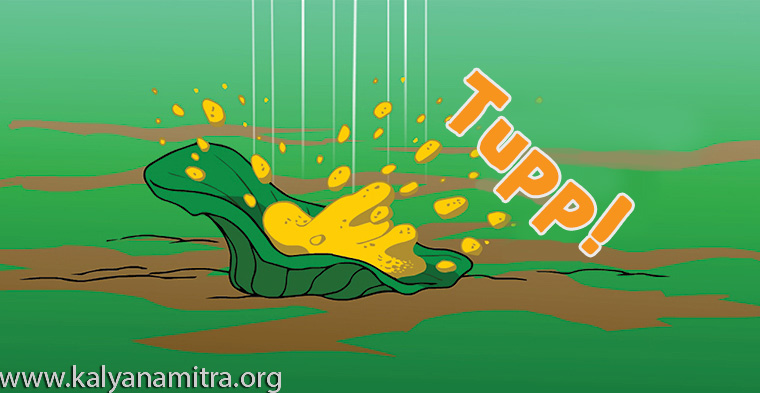
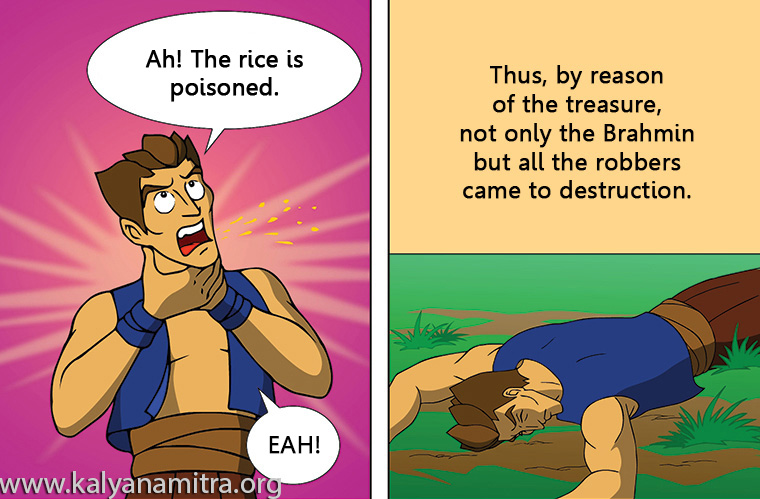
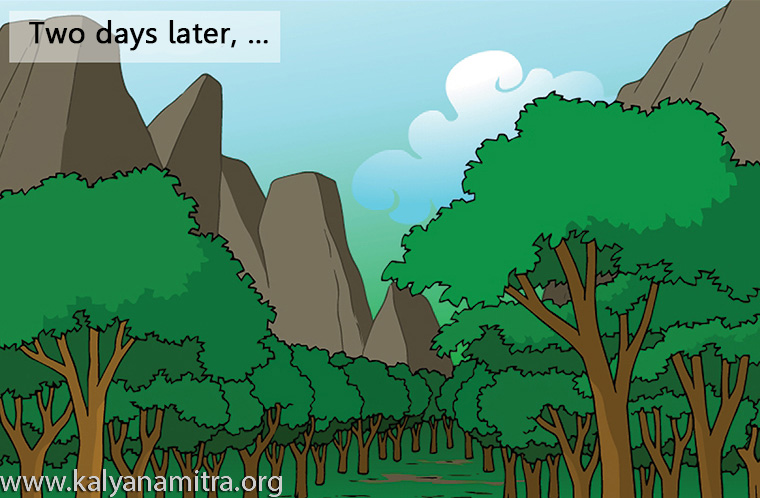
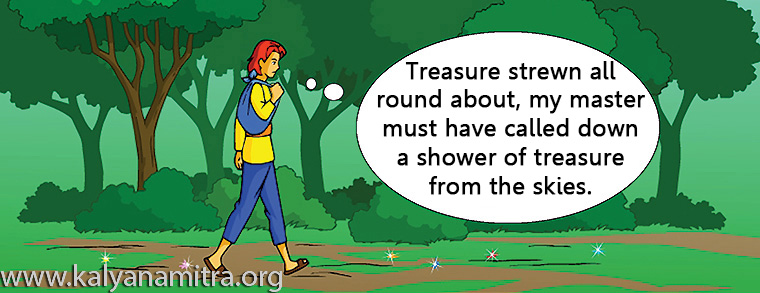

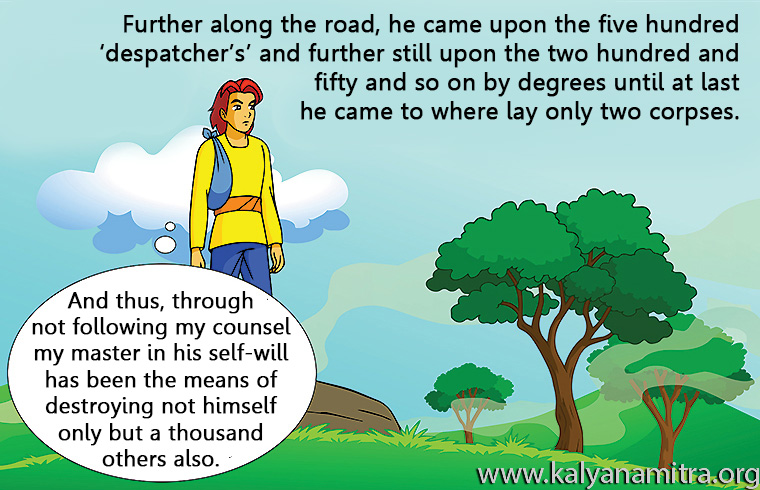
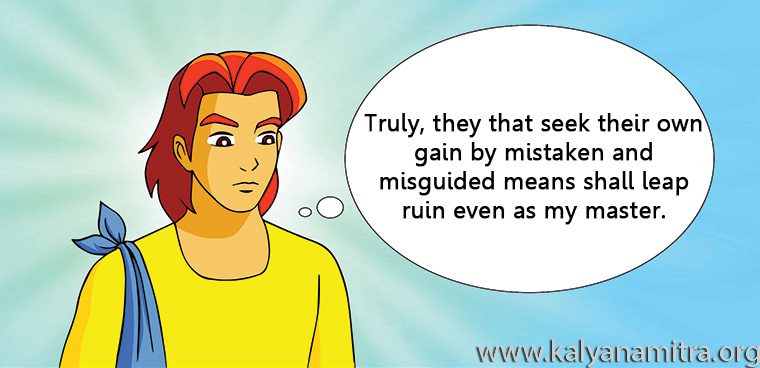
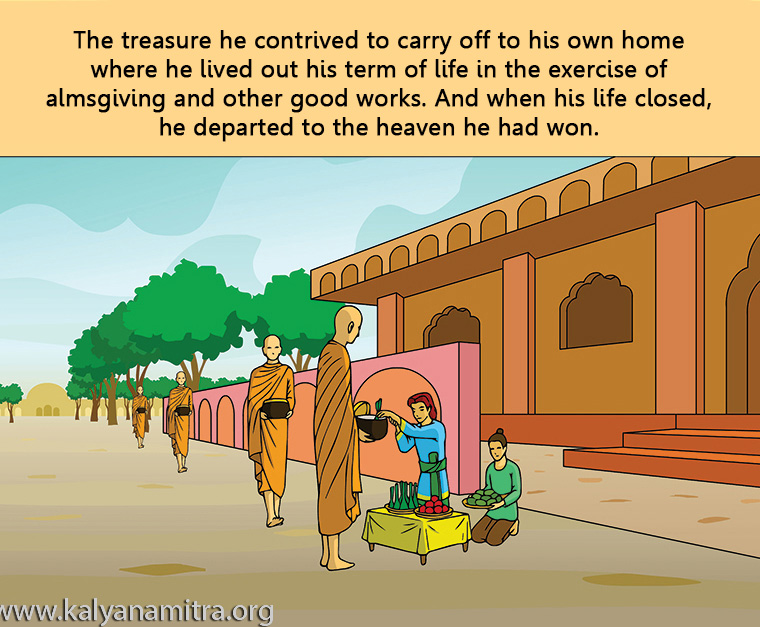
The End
Vedabbha-Jataka
The Origin of the Story
This story was told by the Lord Buddha while was at the monastery of Jetavana about a self-willed brother. Said the Lord Buddha to that Bhikkhu:
‘This is not the first time, monk that you have been self-willed; you were of just the same disposition in bygone times also and therefore it was that, as you would not follow the advice of the wise and good, you came to be cut in two by a sharp sword and were flung on the highway and you were the sole cause why a thousand men met their end.’
And so saying, he told this story of the past.
The story of Jataka
Once on a time, there was a Brahmin in a village who knew the charm called Vedabbha. Now this charm, so they say, was precious beyond all price. For, if at a certain conjunction of the planets the charm was repeated and the gaze bent upwards to the skies, straightway from the heavens there rained the seven things of price —gold, silver, pearl, coral, catseye, ruby and diamond.
In those days the Bodhisatta was a pupil of this Brahmin and one day his master left the village on some business or other and came with the Bodhisatta to the country of Ceti.
In a forest by the way dwelt five hundred robbers —known as ‘the despatchers’ —who made the way impassable. And these caught the Bodhisatta and the Vedabbha Brahmin. (Why, you ask, were they called the despatchers? —Well, the story goes that of every two prisoners they made they used to despatch one to fetch the ransom and that’s why they were called the despatchers. If they captured a father and a son, they told the father to go for the ransom to free his son; if they caught a mother and her daughter, they sent the mother for the money; if they caught two brothers, they let the elder go and so too, if they caught a teacher and his pupil, it was the pupil they set free.)
In this case, therefore, they kept the Vedabbha Brahmin and sent the Bodhisatta for the ransom. And the Bodhisatta said with a bow to his master, ‘In a day or two I shall surely come back; have no fear; only fail not to do as I shall say. Today will come to pass the conjunction of the planets which brings about the rain of the things of price. Take heed lest, yielding to this mishap, you repeat the charm and call down the precious shower. For, if you do, calamity will certainly befall both you and this band of robbers.’ With this warning to his master, the Bodhisatta went his way in quest of the ransom.
At sunset the robbers bound the Brahmin and laid him by the heels. Just at this moment the full moon rose over the eastern horizon and the Brahmin, studying the heavens, knew that the great conjunction was taking place. ‘Why’, thought he, ‘should I suffer this misery? By repeating the charm I will call down the precious rain, pay the robbers the ransom and go free.’ So he called out to the robbers, ‘Friends, why do you take me a prisoner?’ ‘To get a ransom, reverend sir,’ said they. ‘Well, if that is all you want,’ said the Brahmin, ‘make haste and untie me; have my head bathed and new clothes put on me and let me be perfumed and decked with flowers. Then leave me to myself.’
The robbers did as he bade them. And the Brahmin, marking the conjunction of the planets, repeated his charm with eyes uplifted to the heavens. Forthwith the things of price poured down from the skies! The robbers picked them all up, wrapping their booty into bundles with their cloaks. Then with their brethren they marched away and the Brahmin followed in the rear because he could not live alone in the forest. But, as luck would have it, the party was captured by a second band of five hundred robbers! ‘Why do you seize us?’ said the first to the second band. ‘For booty,’ was the answer.
‘If booty is what you want, seize on that Brahmin who by simply gazing up at the skies brought down riches as rain. It was he who gave us all that we have got.’ So the second band of robbers let the first band go and seized on the Brahmin, crying, ‘Give us riches too!’ ‘It would give me great pleasure,’ said the Brahmin; ‘but it will be a year before the requisite conjunction of the planets takes place again. If you will only be so good as to wait till then, I will invoke the precious shower for you.’
‘Rascally Brahmin!’ cried the angry robbers, ‘you made the other band rich off-hand but want us to wait a whole year!’ And they cut him in two with a sharp sword and flung his body in the middle of the road. Then hurrying after the first band of robbers, they killed every man of them too in hand-to-hand fight and seized the booty.
Next, they divided into two companies and fought among themselves, company against company, till two hundred and fifty men were slain. And so they went on killing one another till only two were left alive. Thus did those thousand men come to destruction.
Now, when the two survivors had managed to carry off the treasure they hid it in the jungle near a village and one of them sat there, sword in hand to guard it, whilst the other went into the village to get rice and have it cooked for supper. ‘Covetousness is the root of ruin!’ mused he that stopped by the treasure. ‘When my mate comes back, he’ll want half of this. Suppose I kill him the moment he gets back.’ So he drew his sword and sat waiting for his comrade’s return.
Meanwhile, the other had equally reflected that the booty had to be halved and thought to himself, ‘Suppose I poison the rice and give it him to eat and so kill him and have the whole of the treasure to myself.’ Accordingly, when the rice was boiled, he first ate his own share and then put poison in the rest which he carried back with him to the jungle. But scarce had he set it down when the other robber cut him in two with his sword and hid the body away in a secluded spot. Then he ate the poisoned rice and died then and there. Thus, by reason of the treasure, not only the Brahmin but all the robbers came to destruction.
Howbeit, after a day or two the Bodhisatta came back with the ransom. Not finding his master where he had left him but seeing treasure strewn all round about, his heart misgave him that, in spite of his advice, his master must have called down a shower of treasure from the skies and that all must have perished in consequence and he proceeded along the road. On his way he came to where his master’s body lay cloven in twain upon the way. ‘Alas!’ he cried, ‘he is dead through not heeding my warning.’ Then with gathered sticks he made a pyre and burnt his master’s body, making an offering of wild flowers. Further along the road, he came upon the five hundred ‘despatchers’ and further still upon the two hundred and fifty and so on by degrees until at last he came to where lay only two corpses. Marking how of the thousand all but two had perished and feeling sure that there must be two survivors and that these could not refrain from strife, he pressed on to see where they had gone.
So on he went till he found the path by which with the treasure they had turned into the jungle and there he found the heap of bundles of treasure and one robber lying dead with his rice-bowl overturned at his side.
Realizing the whole story at a glance, the Bodhisatta set himself to search for the missing man and at last found his body in the secret spot where it had been flung.
‘And thus,’ mused the Bodhisatta, ‘through not following my counsel my master in his self-will has been the means of destroying not himself only but a thousand others also. Truly, they that seek their own gain by mistaken and misguided means shall leap ruin even as my master.’
Thus the Bodhisatta went on to say, —‘And even as my master’s misguided and misplaced effort in causing the rain of treasure to fall from heaven wrought both his own death and the destruction of others with him even so shall every other man who by mistaken means seeks to compass his own advantage, utterly perish and involve others in his destruction.’ The treasure he contrived to carry off to his own home where he lived out his term of life in the exercise of almsgiving and other good works. And when his life closed, he departed to the heaven he had won.
The revealing of the identities
Said the Lord Buddha, ‘This is not the first time. Monk, you were self-willed; you were self-willed in bygone times as well and by your self-will you came to utter destruction.’ His lesson ended, he identified the birth by saying:
‘The self-willed monk was the Vedabbha Brahmin of those days and I myself his pupil.’
What are learned from the story:
1. The wrong self-willed should correct themselves to learn how to take good advices on board.
2. Greed engenders destruction to those under its influence.
3. The wise invest wealth to accumulate merit to better the quality of their future existence.
4. Those with misguided and misled effort can cause harm and ruin to their lives and others.
The End